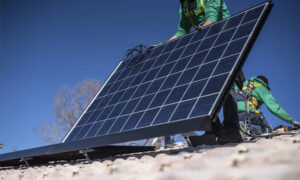Household solar energy systems are a renewable source of energy that generates electricity through solar radiation, which is not only environmentally friendly and clean, but also never exhausts. Home solar systems can reduce energy costs, and once installed, they can reduce reliance on traditional energy, thereby lowering electricity bills. These systems typically have a longer lifespan and can provide reliable power supply to households under appropriate conditions, improving their energy security. Overall, home solar systems not only help individuals save energy and reduce emissions, but also bring dual economic and environmental benefits to households.
Household solar energy systems utilize their green electricity for multiple applications. They provide power for basic household needs such as lighting, electrical appliances, heating, and cooling. Surplus solar power can be stored in batteries for later use, such as during nighttime or cloudy weather conditions. Household solar energy systems can also supply hot water using solar water heaters, converting solar energy into hot water for daily use. Some households may feed surplus solar electricity back into the grid, earning income or receiving electricity credits through solar power generation.
Household solar energy systems offer green, clean electricity for various purposes, contributing to energy efficiency, cost reduction, and enhanced energy security for households.
Solar energy systems generate electricity using sunlight and do not rely on traditional energy sources, allowing users to achieve a degree of energy independence. This means that users can produce and utilize solar power on their own without depending on the power grid or other energy supplies. Therefore, solar energy systems can be seen as a solution that provides independent energy generation.
Household solar energy systems facilitate efficient energy management in several ways. These systems harness sunlight to generate electricity, providing a renewable and clean energy source for various household needs. Many household solar systems are equipped with monitoring and control features, allowing users to track their energy production and consumption in real-time. This information enables users to adjust their energy usage patterns to optimize efficiency and reduce wastage. Some advanced solar systems integrate with smart home technologies, enabling automated energy management through features like programmable thermostats, energy-efficient appliances, and remote monitoring and control capabilities. Household solar energy systems empower users to manage their energy usage effectively, leading to reduced costs, increased sustainability, and greater energy independence.
Benefiting from solar energy leads to lower energy costs for households. Solar energy systems harness the free energy provided by sunlight to generate electricity, eliminating the need to purchase fuel or pay additional fees for power generation. Once installed, solar energy systems have relatively low operation and maintenance costs, significantly reducing household energy expenses. Some regions offer government incentives or subsidies to encourage solar energy usage, further lowering the investment cost for households. Utilizing solar energy can significantly reduce household energy expenditures, saving households a substantial amount of money and enhancing economic benefits.
Household solar energy systems contribute to reducing ecological footprints in several ways. By generating electricity from sunlight, these systems utilize a clean and renewable energy source, significantly reducing the consumption of fossil fuels and the associated greenhouse gas emissions. This helps mitigate climate change and air pollution, thus preserving ecosystems and biodiversity. Household solar systems often lead to decreased reliance on centralized power grids, reducing the need for extensive infrastructure development and land use associated with traditional energy sources. The installation of solar panels on rooftops or other existing structures minimizes land disturbance and habitat destruction compared to large-scale energy projects. Household solar energy systems play a crucial role in promoting sustainability and minimizing environmental impacts, contributing to a healthier planet for current and future generations.
The long-term benefits of solar energy systems include:
1、Long-Term Energy Cost Savings: Once installed, solar energy systems typically have a long lifespan and can provide sustainable and low-cost solar power over an extended period. Compared to relying on traditional energy sources, solar energy systems can significantly reduce energy costs over the long term, saving users substantial amounts of money.
2、Sustainability and Stability: Solar energy is an inexhaustible renewable energy source, with sunlight being abundant worldwide. Therefore, solar energy systems can offer reliable electricity supply and maintain their stability and sustainability over the long term.
3、Increased Property Value: Installing solar energy systems can enhance the value and attractiveness of properties. Purchasing a property with a solar energy system means future owners can enjoy the benefits of energy efficiency and environmental friendliness, making them willing to pay higher property prices.
4、Environmental and Health Benefits: Solar energy generation processes are pollution-free, emitting no greenhouse gases or other harmful substances, thus contributing to improved environmental quality and human health. Long-term use of solar energy systems helps reduce carbon emissions and mitigate climate change, positively impacting the environment and public health.
5、Government Incentives and Subsidies: Many governments provide incentives and subsidies for the installation of solar energy systems, such as tax credits, energy production subsidies, etc. These policies help reduce the investment cost of solar energy systems and increase their long-term benefits.







